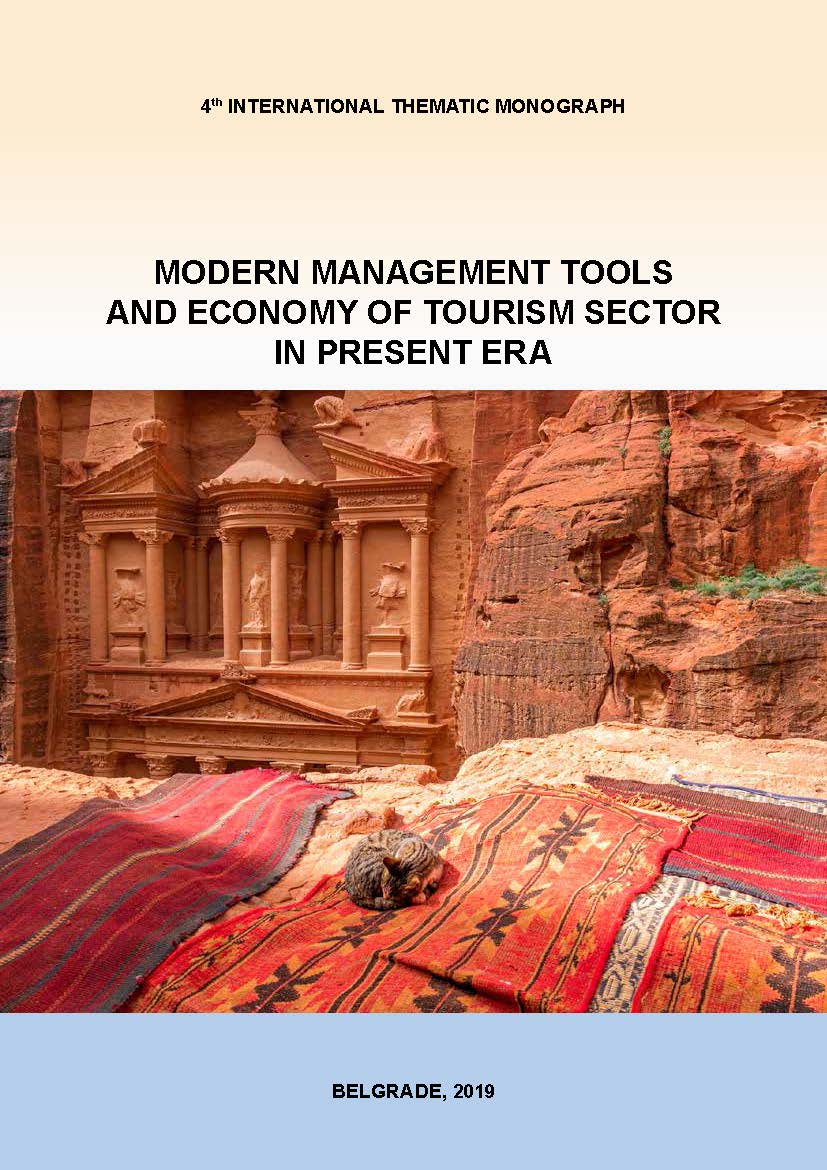|
METHODICAL APPROACHES TO ASSESSMENT OF FACTORS OF TOURISM COMPETITIVENESS OF THE REPUBLIC OF BELARUS Svetlana Khomitch Olga Mozgovaya Vladimir Smoley Alina Martsinovich Belarusian State University, Faculty of International Relations, Department of International Tourism; Minsk, Republic of Belarus DOI: https://doi.org/10.31410/tmt.2019.109 4th International Thematic Monograph - Modern Management Tools and Economy of Tourism Sector in Present Era, Belgrade, 2019, Published by: Association of Economists and Managers of the Balkans in cooperation with the Faculty of Tourism and Hospitality, Ohrid, North Macedonia; ISSN 2683-5673, ISBN 978-86-80194-29-5; Editors: Vuk Bevanda, associate professor, Faculty of Social Sciences, Belgrade, Serbia; Snežana Štetić, full time professor, The College of Tourism, Belgrade, Serbia, Printed by: SKRIPTA International, Belgrade
|
|
Abstract: In the chapter the basic European and international standards of the assessment of a national tourism product are considered. The key components of the Travel & Tourism Competitiveness Index are analysed with a view to identifying specific factors which determine the competitive advantages of the country in the tourism market. In accordance with the World Economic Forum methodology, the assessment of the quantitative and qualitative indicators forming the competitiveness of the national tourism product of the Republic of Belarus is carried out. On the basis of the calculated subindices, SWOT-Clock analysis, and Competitive Advantages Profile the tourism competitiveness of the Republic of Belarus is estimated. The principal competitive advantages of the national tourism product are revealed with a view to improving the national tourism policy. A special algorithm for the elaboration of the tourism destination development strategy for any destination is compiled on the basis of the research. Keywords: Tourism Competitiveness, Tourism Product, Competitiveness Assessment, Competitive Advantages, Tourism Destination Competitiveness Strategy, Travel & Tourism Competitiveness Index, Republic of Belarus. REFERENCES Bahar, O., & Kozak, M. (2007). Advancing Destination Competitiveness Research. Journal of Travel & Tourism Marketing, 22(2), 61–71. https://doi.org/10.1300/j073v22n02_05 Cracolici, M. F., Nijkamp, P., & Rietveld, P. (2008). Assessment of tourism competitiveness by analysing destination efficiency. Tourism Economics, 14(2), 325-342. https://doi.org/10.5367/000000008784460427 Dupeyras, A., & MacCallum, N. (2013). Indicators for measuring competitiveness in tourism. https://doi.org/10.1787/5k47t9q2t923-en Dwyer, L., & Kim, C. (2003). Destination competitiveness: determinants and indicators. Current issues in tourism, 6(5), 369-414. https://doi.org/10.1080/13683500308667962 Enright, M. J., & Newton, J. (2004). Tourism destination competitiveness: a quantitative approach. Tourism management, 25(6), 777-788. https://doi.org/10.1016/j.tourman.2004.06.008 Epstein, M. J., & Manzoni, J. F. (1997). The balanced scorecard and tableau de bord: translating strategy into action. Strategic Finance, 79(2), 28. https://doi.org/10.1016/s0024-6301(97)80925-9 Cucculelli, M., & Goffi, G. (2016). Does sustainability enhance tourism destination competitiveness? Evidence from Italian Destinations of Excellence. Journal of Cleaner Production, 111, 370-382. https://doi.org/10.1016/j.jclepro.2014.12.069 Gomezelj, D. O., & Mihalič, T. (2008). Destination competitiveness—Applying different models, the case of Slovenia. Tourism management, 29(2), 294-307. https://doi.org/10.1016/j.tourman.2007.03.009 Goffi, G., Cucculelli, M., & Masiero, L. (2019). Fostering tourism destination competitiveness in developing countries: The role of sustainability. Journal of Cleaner Production, 209, 101–115. https://doi.org/10.1016/j.jclepro.2018.10.208 Gračan, D., Milojica, V., & Zubović, V. (2008). Benchmarking in Sports Recreational and Health Tourism in Croatia and Slovenia. In 6th International Scientific Conference Management in the Function of Increasing the Tourism Consumption-Tourism Destination Attractions in the Increased Tourist Expenditure. Ibañez, J. S., González, L. P., & Nieto, C. D. N. (2016). Destination competitiveness and sustainable tourism: A critical review. Applied Economics and Finance, 3(2), 1-14. http://dx.doi.org/10.11114/aef.v3i2.1249 Kapiki, S. (2012). Profit Optimization Strategies in Integrated Resorts-Case Study of the Sani Resort, Chalkidiki. In International Conference ‚Competition and Innovation in Tourism: New Challenges in an Uncertain Environment’ (pp. 193-205). Kaplan, R. S. (2009). Conceptual foundations of the balanced scorecard. Handbooks of management accounting research, 3, 1253-1269. https://doi.org/10.1016/s1751-3243(07)03003-9 Kozak, M., & Rimmington, M. (2000). Tourist satisfaction with Mallorca, Spain, as an off-season holiday destination. Journal of Travel Research, 38(3), 260–269. https://doi.org/10.1177/004728750003800308 Mazanec, J. A., Wöber, K., & Zins, A. H. (2007). Tourism destination competitiveness: from definition to explanation?. Journal of Travel Research, 46(1), 86-95. https://doi.org/10.1177/0047287507302389 Popesku, J., & Pavlović, D. (2015). Adapted integrated model of destination competitiveness. In SITCON 2015-Singidunum International Tourism Conference (pp. 9-17). Singidunum University. https://doi.org/10.15308/sitcon-2015-9-17 Reshetnikov, D. G. (2004). International tourism in the foreign trade system of the Republic of Belarus. Minsk, Belarus, BSU. Ritchie, J. B., & Crouch, G. I. (1993). Competitiveness in international tourism: A framework for understanding and analysis. World Tourism Education and Research Centre, University of Calgary. Ritchie, J. R., Crouch, G. I., & Hudson, S. (2000). Assessing the Role of Consumers in the Measurement of Destination Competitiveness and Sustainability. Tourism Analysis, 5(2- 3), 69-76. Ritchie, J. B., & Crouch, G. I. (2003). The competitive destination: A sustainable tourism perspective. Cabi. https://doi.org/10.1079/9780851996646.0000 Ritchie, J. R., & Crouch, G. I. (2010). A model of destination competitiveness/sustainability: Brazilian perspectives. Revista de Administração Pública, 44(5), 1049-1066. https://doi.org/10.1590/s0034-76122010000500003 SWOT-Clock Diamond. (2011-2012). New Dimension. Powerful and effective analysis. https://www.swotclock.com/ Tsai, H., Song, H., & Wong, K. K. (2009). Tourism and hotel competitiveness research. Journal of travel & tourism marketing, 26(5-6), 522-546. https://doi.org/10.1080/10548400903163079 World Economic Forum. (2019). The Travel & Tourism Competitiveness Report 2019. https://www.weforum.org/reports/the-travel-tourism-competitiveness-report-2019
| |||||||
Association of Economists and Managers of the Balkans
- UdEkoM Balkan -
179 Ustanicka St, 11000 Belgrade, Republic of Serbia
E-mail: [email protected]
www.udekom.org.rs
- UdEkoM Balkan -
179 Ustanicka St, 11000 Belgrade, Republic of Serbia
E-mail: [email protected]
www.udekom.org.rs
Tel. +381 62 812 5779
VAT number: 108747027
Registration number.: 28157347
Registration number.: 28157347


